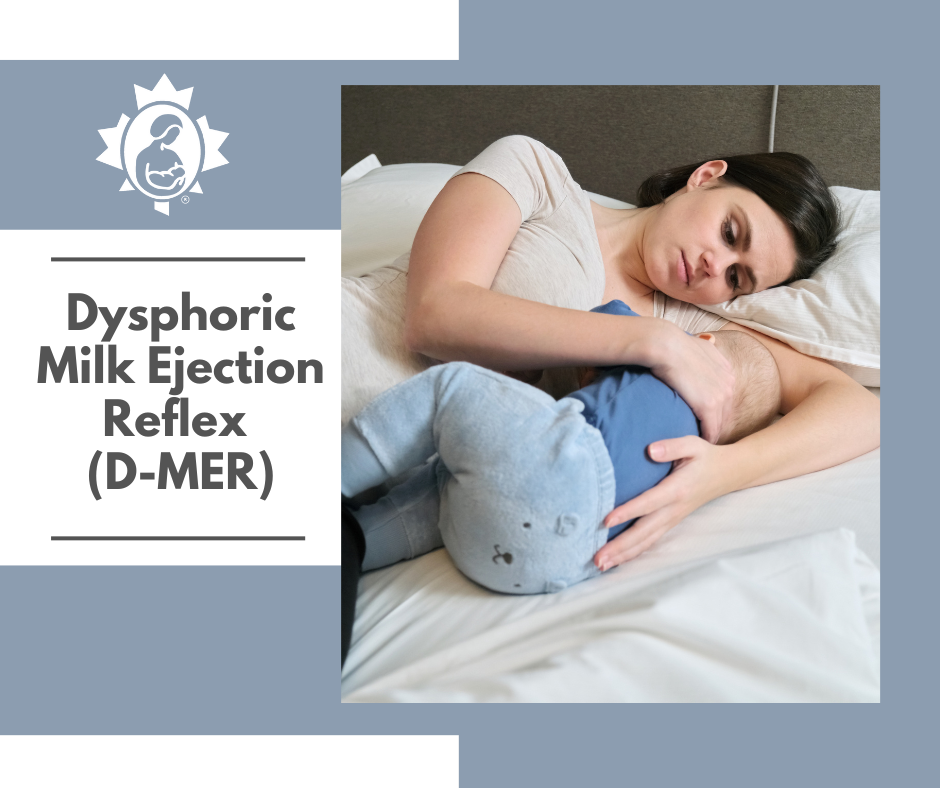
What is D-MER
Dysphoric Milk Ejection Reflex (D-MER) is a condition in which mothers feel a range of negative emotions in the few minutes before and after the milk ejection reflex (‘let down’). These feelings are often described as sadness, irritability, anxiety and restlessness. They come on suddenly right before the let down and tend to last for around 30 seconds to two minutes. After that, the mother feels fine again. The mother may or may not be able to feel the let down when it happens.
D-MER may be mild, moderate or severe. It depends on the intensity of the emotions, the length of time it takes for the mother to feel better, and how many let downs per feeding the mother feels.
D-MER is not
- nausea.
- postpartum depression.
- ‘breastfeeding aversion’.
- dislike of breastfeeding because of nipple pain.
- anxiety about milk supply or your baby’s health.
What is happening in your body
The milk ejection reflex is the action that releases the milk from your breasts. It is caused by an increase in the hormone oxytocin. When oxytocin rises, there is a dip in another hormone called dopamine. It is not clear exactly what causes D-MER. One theory is that those who experience D-MER have a more significant drop in dopamine than those who do not. Another theory is that those with D-MER experience a higher spike in oxytocin than those who do not.
It is important to note that D-MER is a physiological (bodily) response to a sudden change in hormones. It is not psychological (in your mind). Psychotherapy or ‘thinking good thoughts’ will not prevent D-MER.
Treatment
At the moment there is no standard treatment for D-MER. If you suffer from D-MER you may find the following ideas from others helpful:
- Learn about D-MER.
- Educate your family about D-MER and ask for their support and encouragement.
- Get adequate self-care Connect with others who also experience D-MER.
- Use deep breathing during a let down.
- Distract yourself so you can ignore the negative emotions when they appear.
- Take supplements such as vitamin D, B-complex and probiotics (consult with your healthcare provider before taking any supplements).
- Drink cold water during a let down.
The following often makes D-MER worse:
- Not being educated about D-MER.
- Feeling isolated.
- Low carb diets.
- Lack of adequate self-care.
- Touch.
- Birth control.
- Caffeine.
- Stress.
- Nursing with other people present.
- Galactagogues (substances that can increase milk production).
- Long periods between feedings.
- Menstruation.
- Disorderly environment.
Depending on how severe D-MER is, the nursing parent could find it resolves anywhere from three months to over one year.
Remember, these negative feelings are caused by hormones. They do not reflect your true feelings of motherhood. With good information and some helpful strategies, you can enjoy breastfeeding your baby for as long as you like.
For more information, resources, mother’s stories, support, research and more, see D-MER.org which provided the information presented here.
You can also contact your local La Leche League Canada Leader for breastfeeding information and support and to find out about attending a La Leche League Group meeting virtually or in-person.
Updated 2024
